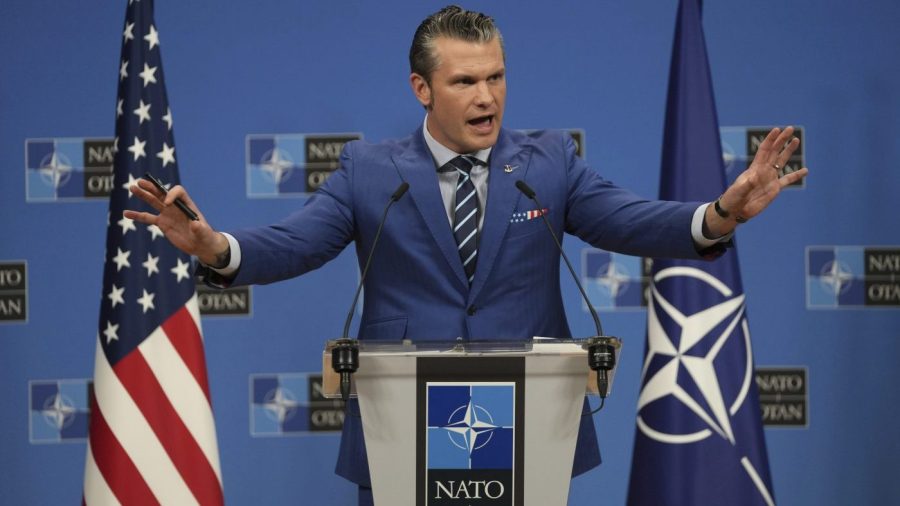
During last year’s presidential election, supporters of President Trump sought to reassure skeptics that his rhetoric on Ukraine was just an electoral pose. David Kramer, a Bush-era State Department official, told Vox that Trump had no desire to see Ukraine defeated: “The last thing that Trump is going to want there would be a chaotic collapse, a la Afghanistan 2.0.”
No one should have been fooled. The evidence was there to indicate that a Trump victory would mean a drastic reduction of military and financial assistance to Ukraine and intense pressure for an end to the conflict, no matter what the terms. Anyone who is now surprised was not listening.
Secretary of Defense Pete Hegseth confirmed this approach last week in Brussels at a meeting of the Ukraine Defense Contact Group, an alliance of 57 countries and the European Union that coordinates military assistance to Kyiv. His message was simple: The war “must end,” and the U.S. was willing to offer substantial concessions to win over Vladimir Putin.
America is turning its back on Ukraine. Hegseth stated that returning to the pre-2014 borders with Russia “is an unrealistic objective,” Ukraine’s potential membership of NATO is not “a realistic outcome of a negotiated settlement,” policing a ceasefire will fall to European militaries and “as part of any security guarantee, there will not be U.S. troops deployed to Ukraine.”
Putin must scarcely believe his luck. The Trump administration’s position means Russia will almost certainly retain the Ukrainian territory it has seized — about one-fifth of the country — and can exercise an effective veto over Ukraine’s future foreign policy, with NATO membership off the table.
The icing on Moscow’s cake is the disavowal of further American interest or involvement in the region. Ukraine is now only a problem for European governments.
Compounding this is Trump’s unilateral engagement with his Russian counterpart, of whom he has often spoken with adolescent admiration. They had a “lengthy and highly productive” conversation and “agreed to have our respective teams start negotiations immediately.” Ukrainian President Volodymyr Zelensky was “informed” of the conversation after the fact. Trump said he and Putin had “agreed to work together, very closely, including visiting each other’s nations,” though an initial face-to-face meeting will take place in Saudi Arabia in the “not too distant future.”
It is within Trump’s rights to conclude that a protracted war of conquest in eastern Europe is not an American concern. He is unquestionably wrong to describe it as “totally unnecessary,” as the families of the more than 100,000 Ukrainian soldiers and civilians killed following Russia’s invasion know. But from the Oval Office, the steppes around Kharkiv and Donetsk must seem very distant.
Trump and Hegseth should be honest about the consequences of their policy choices. If the settlement they have sketched out were imposed on Ukraine now, Putin would learn some valuable lessons. First, Putin would conclude that armed aggression against a neighbor, including probable war crimes and crimes against humanity, pays off if prosecuted with sufficient determination.
An estimated 250,000 Russian soldiers have been killed (four times America’s losses in Vietnam) but in return Russia occupies about 20 percent of Ukraine, including Crimea and its vital warm-water naval base at Sevastopol. Ukrainian membership of NATO is off the table, and the U.S. has demonstrated that it is no longer committed to the defense of Europe or to Article Five of the North Atlantic Treaty, which governs collective security.
The weekend’s Munich Security Conference brought together world leaders and military chiefs, including Vice President JD Vance and Secretary of State Marco Rubio. Yes, Munich — the parallels with Britain and France’s 1938 surrender of Czechoslovakia to the Nazis are unavoidable. Hegseth has denied that America is “betraying” Ukraine, insisting that “stopping the killing … will require both sides recognizing things they don’t want to.”
But the likely conclusion does not represent an equitable peace. The Kremlin has paid in blood to refine its playbook and measure the West’s endurance. This is not just about Ukraine, because Putin knows now what he could before only guess: that if — or, more likely, when — his territorial ambitions turn towards the Baltic states, Poland, Georgia or any country within what he calls Russia’s “near abroad,” he has a stunning opportunity to assert military dominance over them — or worse.
The U.S. has decided it no longer has a strategic interest or any moral commitment to its allies. After all, if Trump covets Greenland and the Panama Canal, why should Putin be denied a few choice cuts in the great carve-up?
Eliot Wilson is a freelance writer on politics and international affairs and the co-founder of Pivot Point Group. He was senior official in the U.K. House of Commons from 2005 to 2016, including serving as a clerk of the Defence Committee and secretary of the U.K. delegation to the NATO Parliamentary Assembly.












